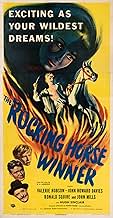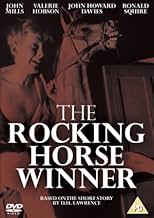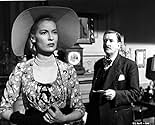IMDb RATING
7.2/10
1.5K
YOUR RATING
A young boy receives a rocking horse for Christmas and soon learns that he is able to pick the winning horse at the races.A young boy receives a rocking horse for Christmas and soon learns that he is able to pick the winning horse at the races.A young boy receives a rocking horse for Christmas and soon learns that he is able to pick the winning horse at the races.
- Director
- Writers
- Stars
Anthony Holles
- Bowler Hat
- (uncredited)
Melanie Mackenzie
- Matilda Grahame
- (uncredited)
Michael Ripper
- 2nd Chauffeur
- (uncredited)
Johnnie Schofield
- 1st Chauffeur
- (uncredited)
Caroline Steer
- Joan Grahame
- (uncredited)
- Director
- Writers
- All cast & crew
- Production, box office & more at IMDbPro
Featured reviews
This is about a British family. The mother (Valerie Hobson) spends beyond her means. The father gambles...badly and loses his job. The family is close to bankruptcy when their young son Paul (John Howard Davies) develops this uncanny ability to predict winners in horse races. How does he do it? By riding his rocking horse.
I read the D.H. Lawrence short story back in college in the 1980s and never forgot it. I heard about this film but was afraid to see it...I didn't think there was any way to film the story without it looking stupid. Also this movie is hard to find. I finally did catch it and I was impressed. They managed to take a very dark and strange short story and make an excellent movie out of it. It moves quickly (it's only 90 minutes) and I was never bored for one second. The acting really helps to carry this one. Hobson is just OK as the mother but Davies as the little boy, John Mills as Bassett and Ronald Squire as Uncle Oscar are just great. Ultimately the movie is sad and depressing but just incredible. This was way too ahead of its time to connect with audiences of 1950 and it (sadly) remains unknown to this day. Well worth seeing.
I read the D.H. Lawrence short story back in college in the 1980s and never forgot it. I heard about this film but was afraid to see it...I didn't think there was any way to film the story without it looking stupid. Also this movie is hard to find. I finally did catch it and I was impressed. They managed to take a very dark and strange short story and make an excellent movie out of it. It moves quickly (it's only 90 minutes) and I was never bored for one second. The acting really helps to carry this one. Hobson is just OK as the mother but Davies as the little boy, John Mills as Bassett and Ronald Squire as Uncle Oscar are just great. Ultimately the movie is sad and depressing but just incredible. This was way too ahead of its time to connect with audiences of 1950 and it (sadly) remains unknown to this day. Well worth seeing.
In London, the teenager Paul Grahame (John Howard Davies) lives with his upper class but financially broken family. His wasteful mother Hester Grahame (Valerie Hobson) is a compulsive buyer, spending all the family money in new expensive dresses, jewels and objects for their home. His father Richard Grahame (Hugh Sinclair) is a gambler, losing money in the horse races. His uncle Oscar Cresswell (Ronald Squire) is permanently covering the Grahame family debts. When the servant Bassett (John Mills) is hired, Paul finds that he can predict the winner of the horses' races rocking his wooden horse. Paul asks Bassett to become his partner, betting their money in the races, trying to prove that he is lucky and silencing the permanent whisper of the house needing more money. But the prize is high and fatal.
"The Rocking Horse Winner" is a dark tale of compulsion of D. H. Lawrence. I have never read his short story, and I did not feel any sexual connotation as mentioned in some reviews that I have glanced. The story is very disturbing and quite unpleasant, with great direction and performances, especially of Valerie Hobson in the role of a compulsive shallow woman. My vote is seven.
Title (Brazil): "O Cavalo Campeão" ("The Horse Winner")
"The Rocking Horse Winner" is a dark tale of compulsion of D. H. Lawrence. I have never read his short story, and I did not feel any sexual connotation as mentioned in some reviews that I have glanced. The story is very disturbing and quite unpleasant, with great direction and performances, especially of Valerie Hobson in the role of a compulsive shallow woman. My vote is seven.
Title (Brazil): "O Cavalo Campeão" ("The Horse Winner")
This particular D.H. Lawrence story has been done three additional times since this version came out in 1950. They would have to go some to compete with this film for drama and suspense.
I had never seen this film before tonight and the title is so incredibly deceptive. I expected a charming children's fantasy, but got something quite a bit different. One thing I would never do is allow small kids to see The Rocking Horse Winner. They will have nightmare's for years and will NEVER want to get on a rocking horse if you have one.
Hugh Sinclair and Valerie Hobson play a pair of post World War II self indulgent parents who are living way beyond their means, like a lot of folks are today on both sides of the pond. He gambles and she spends money on luxury items like there's no tomorrow. Her brother Ronald Squire bails her out a lot, but he's having no more of it.
All this is having an effect on the United Kingdom's best known child star of the time John Howard Davies. He's the oldest of the three kids and a withdrawn, but sensitive kid who knows there's something wrong.
Davies makes friends with the new handyman John Mills who is a wounded war veteran and before the war used to work as jockey in his youth. When Davies gets among other things a rocking horse for Christmas, Mills shows him how to ride ace-deuce, jockey style. Davies becomes obsessed with the horse and after a while he starts imagining the horse telling him about winning tips at the local track. When he's "really sure" these ponies have a habit of coming in.
Given these plot premises it sounds like you're setting up a comedy, but actually what we get is tragedy here, a stark a bitter tragedy.
Anthony Pellisier wrote and directed and John Mills produced this film for J. Arthur Rank. Pellisier used some unique and terrifying camera angles and makes the rocking horse an incredibly sinister figure. And he doesn't do too bad with his human players either.
The Rocking Horse Winner after almost 60 years still holds up well as one of the most sinister films I've ever seen. Don't be fooled by the title, definitely NOT one to have the kids view.
I had never seen this film before tonight and the title is so incredibly deceptive. I expected a charming children's fantasy, but got something quite a bit different. One thing I would never do is allow small kids to see The Rocking Horse Winner. They will have nightmare's for years and will NEVER want to get on a rocking horse if you have one.
Hugh Sinclair and Valerie Hobson play a pair of post World War II self indulgent parents who are living way beyond their means, like a lot of folks are today on both sides of the pond. He gambles and she spends money on luxury items like there's no tomorrow. Her brother Ronald Squire bails her out a lot, but he's having no more of it.
All this is having an effect on the United Kingdom's best known child star of the time John Howard Davies. He's the oldest of the three kids and a withdrawn, but sensitive kid who knows there's something wrong.
Davies makes friends with the new handyman John Mills who is a wounded war veteran and before the war used to work as jockey in his youth. When Davies gets among other things a rocking horse for Christmas, Mills shows him how to ride ace-deuce, jockey style. Davies becomes obsessed with the horse and after a while he starts imagining the horse telling him about winning tips at the local track. When he's "really sure" these ponies have a habit of coming in.
Given these plot premises it sounds like you're setting up a comedy, but actually what we get is tragedy here, a stark a bitter tragedy.
Anthony Pellisier wrote and directed and John Mills produced this film for J. Arthur Rank. Pellisier used some unique and terrifying camera angles and makes the rocking horse an incredibly sinister figure. And he doesn't do too bad with his human players either.
The Rocking Horse Winner after almost 60 years still holds up well as one of the most sinister films I've ever seen. Don't be fooled by the title, definitely NOT one to have the kids view.
I've seen a few rocking horses in my time, but none that looked like this one. With its predatory teeth, gaping mouth, and flaring eyes, it looks more like Halloween than X-mas. No wonder it's got supposedly demonic powers. But then the social-climbing parents need help of the monetary kind. Mom (Hobson) isn't happy with just a big house and servants. She wants top status among the British upper-class, and by golly she'll spend whatever it takes, affordable or not. Meanwhile, Dad (Sinclair) tries to keep up by losing at gambling, while Uncle Oscar (Squire) is finally fed up with doling out money from the family trust. That leaves the kids (Davies, et.al.) to make out as best they can with neglectful parents. So where will the money come from, and how will the kids connect with Mom. Enter an infernal toy.
I can see the premise being done on the Twilight Zone, but certainly not to better effect. With his rather narrow eyes, little Paul (Davies) is positively scary when demonically whipping both himself and the wooden horse into a sweaty frenzy. A thousand gory films could not register more strongly than these inspired scenes. It's a unnerving spectre that moves the entire film into a special category of its own.
Surprisingly, the suspense of the rocking horse is not built up in the movie's main part. Instead, the film's majority deals with more ordinary matters: placing bets, pawning dresses, Uncle Oscar, Bassett (Mills) and Paul. Thus a natural contrast is laid for the demonic scenes. Nonetheless, the acting is first-rate, though Sinclair pretty much fades into the background as Dad, while Hobson's mom takes center stage in sleekly determined fashion. Then again, Mills is especially winning as the humane handy man. Happily, he furnishes needed companionship for the lonely boy. And, given the parent's upper-class pretensions, I detect a comment on the effects of Britain's traditional class system.
To me, however, it's never clear whether the whispering comes from the house or from Paul's internalizing of the family's money troubles. But, either way, the never-ending need for picking race-horse winners drives poor Paul into continuing his rocking horse frenzy. The tragedy lies in the personal toll this takes on him for the sake of his generally oblivious mother. Still, it is possible, unless I missed something, that Paul is just lucky picking winners rather than rocking horse possessed. After all, he wants to think he's lucky and maybe he is. In that case, no supernatural would be involved. Instead the upshot would be how an imaginative boy internalizes overriding family greed. In that case, I think the ending would be even more tragic. I may be mistaken, but I don't think the screenplay forecloses this second possibility. Either way, however, those final scenes are genuinely memorable.
Speaking of endings, it's certainly not one Hollywood's Motion Picture Code would have permitted. Good for the British. Because what we're left with is a truly remarkable one-of-a- kind, whose moral is as timely now as 6 decades ago. Don't miss it.
I can see the premise being done on the Twilight Zone, but certainly not to better effect. With his rather narrow eyes, little Paul (Davies) is positively scary when demonically whipping both himself and the wooden horse into a sweaty frenzy. A thousand gory films could not register more strongly than these inspired scenes. It's a unnerving spectre that moves the entire film into a special category of its own.
Surprisingly, the suspense of the rocking horse is not built up in the movie's main part. Instead, the film's majority deals with more ordinary matters: placing bets, pawning dresses, Uncle Oscar, Bassett (Mills) and Paul. Thus a natural contrast is laid for the demonic scenes. Nonetheless, the acting is first-rate, though Sinclair pretty much fades into the background as Dad, while Hobson's mom takes center stage in sleekly determined fashion. Then again, Mills is especially winning as the humane handy man. Happily, he furnishes needed companionship for the lonely boy. And, given the parent's upper-class pretensions, I detect a comment on the effects of Britain's traditional class system.
To me, however, it's never clear whether the whispering comes from the house or from Paul's internalizing of the family's money troubles. But, either way, the never-ending need for picking race-horse winners drives poor Paul into continuing his rocking horse frenzy. The tragedy lies in the personal toll this takes on him for the sake of his generally oblivious mother. Still, it is possible, unless I missed something, that Paul is just lucky picking winners rather than rocking horse possessed. After all, he wants to think he's lucky and maybe he is. In that case, no supernatural would be involved. Instead the upshot would be how an imaginative boy internalizes overriding family greed. In that case, I think the ending would be even more tragic. I may be mistaken, but I don't think the screenplay forecloses this second possibility. Either way, however, those final scenes are genuinely memorable.
Speaking of endings, it's certainly not one Hollywood's Motion Picture Code would have permitted. Good for the British. Because what we're left with is a truly remarkable one-of-a- kind, whose moral is as timely now as 6 decades ago. Don't miss it.
This is a very intriguing British film, quite unlike most others from the period; it's a pretty dark Freudian tale, from a D H Lawrence short story, whose overt depiction of a schoolboy and his magic toy gets away with a strictly taboo subtext. The focus is on a well-to-do household of the period, in which the hierarchy of adults and children is strictly defined; the parents try to keep their son Paul, wearing short trousers even in the depths of winter, innocent of their adult concerns in particular, their problems with money. After discovering that his rocking horse gives him secret powers when he rides it hard enough, with giddy camera-work showing how it feels when he 'gets there', the boy tries to usurp his father's role to provide his mother with what she needs. John Mills produced the film, and his interest was no doubt linked to his typecast image: he normally plays rather piously unimpeachable characters, so it's quite a shock to see him here directing the lad's first experience of 'riding'. The only slight difficulty is that the boy actor needed to be nearer his early teens to carry the weight of the story's darker implications.
Did you know
- TriviaBassett says that he had "... fine plans for teaching Gordon Richards a thing or two...". Gordon Richards (1904 - 1986) was an English jockey. He was the Champion Jockey in British flat horse-racing 26 times, a record that still stands.
- Quotes
[last lines]
Hester Grahame: I wanted to see the end of it, just wanted to be sure it had gone. Gone for good.
Bassett: You won't never see the end of it, ma'am, nor will I. As long as ever we'll live, we'll remember, and we'll know just what it is was done.
- ConnectionsVersion of Winner (1977)
- SoundtracksSilent Night
(uncredited)
Music by Franz Xaver Gruber
English lyrics by John Freeman Young
Sung by the carollers
Details
- Release date
- Country of origin
- Language
- Also known as
- Dobitnik sa drvenog konjića
- Filming locations
- Denham Studios, Denham, Buckinghamshire, England, UK(studio: made at Denham Studios, London, England)
- Production companies
- See more company credits at IMDbPro
- Runtime1 hour 31 minutes
- Color
- Aspect ratio
- 1.37 : 1
Contribute to this page
Suggest an edit or add missing content

Top Gap
By what name was The Rocking Horse Winner (1949) officially released in India in English?
Answer


























